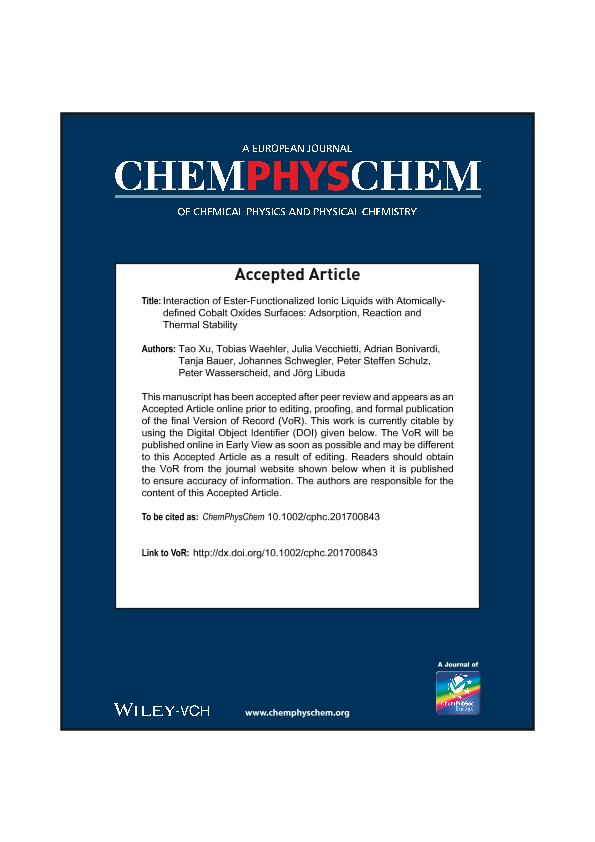Mostrar el registro sencillo del ítem
dc.contributor.author
Xu, Tao
dc.contributor.author
Waehler, Tobias
dc.contributor.author
Vecchietti, María Julia

dc.contributor.author
Bonivardi, Adrian Lionel

dc.contributor.author
Bauer, Tanja
dc.contributor.author
Schwegler, Johannes
dc.contributor.author
Schulz, Peter S.
dc.contributor.author
Wasserscheid, Peter
dc.contributor.author
Libuda, Joerg
dc.date.available
2018-03-28T16:04:13Z
dc.date.issued
2017-12
dc.identifier.citation
Xu, Tao; Waehler, Tobias; Vecchietti, María Julia; Bonivardi, Adrian Lionel; Bauer, Tanja; et al.; Interaction of Ester-Functionalized Ionic Liquids with Atomically-Defined Cobalt Oxides Surfaces: Adsorption, Reaction and Thermal Stability; Wiley VCH Verlag; Chemphyschem; 18; 23; 12-2017; 3443-3453
dc.identifier.issn
1439-4235
dc.identifier.uri
http://hdl.handle.net/11336/40365
dc.description.abstract
Hybrid materials consisting of ionic liquid (ILs) films on supported oxides hold a great potential for applications in electronic and energy materials. In this work, we have performed surface science model studies scrutinizing the interaction of ester-functionalized ILs with atomically defined Co3O4(111) and CoO(100) surfaces. Both supports are prepared under ultra-high vacuum (UHV) conditions in form of thin films on Ir(100) single crystals. Subsequently, thin films of three ILs, 3-butyl-1-methyl imidazolium bis(trifluoromethyl-sulfonyl) imide ([BMIM][NTf2]), 3-(4-methoxyl-4-oxobutyl)-1-methylimidazolium bis(trifluoromethyl-sulfonyl) imide ([MBMIM][NTf2]), and 3-(4-isopropoxy-4-oxobutyl)-1-methylimidazolium bis(trifluoromethyl-sulfonyl) imide ([IPBMIM][NTf2]), were deposited on these surfaces by physical vapor deposition (PVD). Time-resolved and temperature-programmed infrared reflection absorption spectroscopy (TR-IRAS, TP-IRAS) were applied to monitor in situ the adsorption, film growth, and thermally induced desorption. By TP-IRAS, we determined the multilayer desorption temperature of [BMIM][NTf2] (360±5 K), [MBMIM][NTf2] (380 K) and [IPBMIM][NTf2] (380 K). Upon deposition below the multilayer desorption temperature, all three ILs physisorb on both cobalt oxide surfaces. However, strong orientation effects are observed in the first monolayer, where the [NTf2]− ion interacts with the surface through the SO2 groups and the CF3 groups point towards the vacuum. For the two functionalized ILs, the [MBMIM]+ and [IPBMIM]+ interact with the surface Co2+ ions of both surfaces via the CO group of their ester function. A very different behavior is found, if the ILs are deposited above the multilayer desorption temperature (400 K). While for [BMIM][NTf2] and [MBMIM][NTf2] a molecularly adsorbed monolayer film is formed, [IPBMIM][NTf2] undergoes a chemical transformation on the CoO(100) surface. Here, the ester group is cleaved and the cation is chemically linked to the surface by formation of a surface carboxylate. The IL-derived species in the monolayer desorb at temperatures around 500 to 550 K.
dc.format
application/pdf
dc.language.iso
eng
dc.publisher
Wiley VCH Verlag

dc.rights
info:eu-repo/semantics/openAccess
dc.rights.uri
https://creativecommons.org/licenses/by-nc-sa/2.5/ar/
dc.subject
Chemical Anchoring
dc.subject
Cobalt Oxide
dc.subject
Ionic Liquids
dc.subject
Iras
dc.subject
Thermal Stability
dc.subject.classification
Otras Ciencias Químicas

dc.subject.classification
Ciencias Químicas

dc.subject.classification
CIENCIAS NATURALES Y EXACTAS

dc.title
Interaction of Ester-Functionalized Ionic Liquids with Atomically-Defined Cobalt Oxides Surfaces: Adsorption, Reaction and Thermal Stability
dc.type
info:eu-repo/semantics/article
dc.type
info:ar-repo/semantics/artículo
dc.type
info:eu-repo/semantics/publishedVersion
dc.date.updated
2018-03-21T16:00:50Z
dc.journal.volume
18
dc.journal.number
23
dc.journal.pagination
3443-3453
dc.journal.pais
Alemania

dc.journal.ciudad
Weinheim
dc.description.fil
Fil: Xu, Tao. Universitat Erlangen-Nuremberg; Alemania
dc.description.fil
Fil: Waehler, Tobias. Universitat Erlangen-Nuremberg; Alemania
dc.description.fil
Fil: Vecchietti, María Julia. Consejo Nacional de Investigaciones Científicas y Técnicas. Centro Científico Tecnológico Conicet - Santa Fe. Instituto de Desarrollo Tecnológico para la Industria Química. Universidad Nacional del Litoral. Instituto de Desarrollo Tecnológico para la Industria Química; Argentina
dc.description.fil
Fil: Bonivardi, Adrian Lionel. Consejo Nacional de Investigaciones Científicas y Técnicas. Centro Científico Tecnológico Conicet - Santa Fe. Instituto de Desarrollo Tecnológico para la Industria Química. Universidad Nacional del Litoral. Instituto de Desarrollo Tecnológico para la Industria Química; Argentina
dc.description.fil
Fil: Bauer, Tanja. Universitat Erlangen-Nuremberg; Alemania
dc.description.fil
Fil: Schwegler, Johannes. Universitat Erlangen-Nuremberg; Alemania
dc.description.fil
Fil: Schulz, Peter S.. Universitat Erlangen-Nuremberg; Alemania
dc.description.fil
Fil: Wasserscheid, Peter. Universitat Erlangen-Nuremberg; Alemania
dc.description.fil
Fil: Libuda, Joerg. Universitat Erlangen-Nuremberg; Alemania
dc.journal.title
Chemphyschem

dc.relation.alternativeid
info:eu-repo/semantics/altIdentifier/doi/http://dx.doi.org/10.1002/cphc.201700843
Archivos asociados
